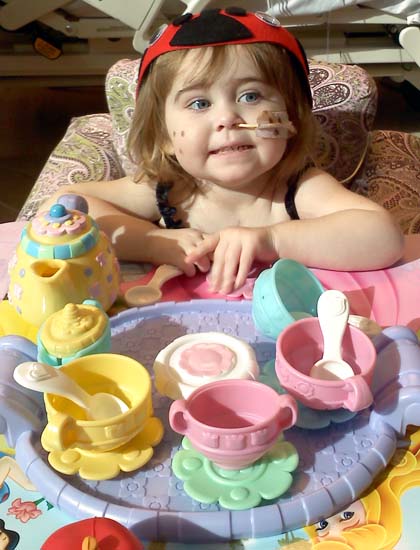Penny Gorman is a 2-year-odd patient at Mattel Children’s Hospital UCLA who has been awaiting a heart transplant since August.
In the interim, she’s kept alive by the Berlin Heart, a mobile device that allows her to leave her bed. Still, her trips to the hospital’s playroom are short; they are limited to half an hour before she must be plugged in again, said Jina Gorman, her mother.
To help Penny cope with life in the hospital, Jina and her parents have moved into an apartment near UCLA. Jina had previously lived in Phoenix; her parents, Michigan.
Penny’s insurance will pay her family’s housing expenses until January but covers none of her medical bills, the first of which amounted to $7,500.
The cost of keeping Penny in the hospital has forced her father to move in with his parents. He travels to UCLA every weekend to see his daughter but must reside in Phoenix to keep his job.
Penny’s medical expenses will continue to build up until a heart transplant can be found. Then the surgery itself will have to be paid for, as will her three-month recovery.
The family may even have to cover the cost of the $36,000 Berlin Heart.
The family’s community has been supportive. A “Penny Drive” fund has been established on her behalf, church fundraisers and a silent auction have been held in her name. One friend, Jina said, has made “Save a Penny” shirts to help raise funds.
Still, the expenses have forced Jina and her husband to opt out of any Christmas shopping this year.
“We’re praying for a heart. That’s the best gift we could ever get,” Jina said.
It was for the sake of families like Penny’s that the toy drive, a joint effort of the hospital and various UCLA organizations, was conceived 20 years ago. Donated toys are available for parents like Jina in the hospital’s shopping room. Parents may then give the toys to their children as holiday presents.
Penny’s family’s situation is hardly unique. The hospital is home to over 6,000 young inpatients annually.
Like Penny, many must await transplants or receive treatments for over a year, forcing their families to make UCLA their home, said Denise Matsuyama-Lai, a senior child life specialist at the hospital.
A partnership between the hospital and various UCLA organizations hopes to bring some much-needed cheer this holiday to the hospital’s young inpatients.
Donations also benefit families who have had to bring their other, healthy children to reside near the hospital. Without the donated toys, these children would often be unable to play with their sick siblings, said Kevin Clark, a founder and 20-year veteran of the program.
In the past, donations have kept the hospital’s playroom well stocked.
“I have a very generous, anonymous person who donates every year, who last year donated two Xboxes, two Xbox 360s and two PlayStation 3s.” The kicker? “50 games,” Clark said.
Another year, the hospital was unable to provide strollers for its youngest residents. Infection can be life-threatening for some patients. As such, the hospital couldn’t risk reusing strollers, and some families were left empty-handed. But donors pulled through, and the hospital received 36 strollers, Clark said.
This year, volunteers worry that the recession will impact donations.
“People are being as generous as they can and are trying to give as much as they can,” Matsuyama-Lai said. “Unfortunately, everyone’s having to tighten their belts and are unable to give as much as they have in the past.”
Corporations, especially, have had to trim donations from their budgets, Clark said, making individual donors all the more valuable.
“I think it’s vital to volunteer, and the holidays bring out the best in people as far as I’m concerned. I’ve been Santa for 31 years now, and I get to see that,” Clark said. “The toy drive is a way that anybody can give back.”
The donations are collected in toy barrels which can be found across campus, and the barrels are available to anyone who wants to help collect toys.
